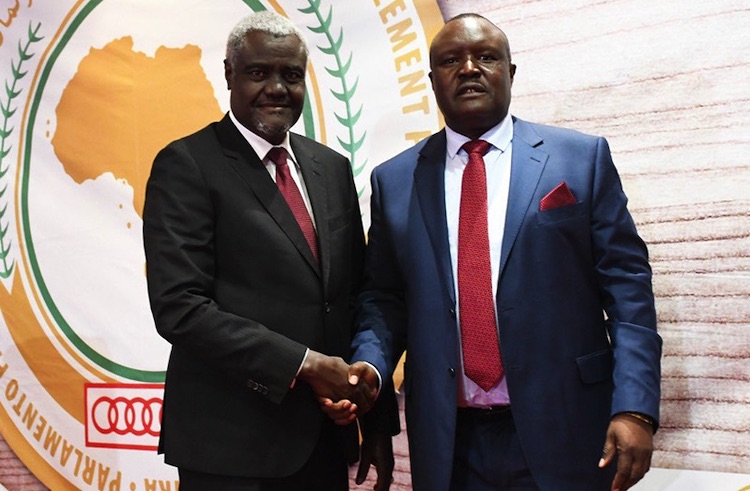By Clement Akoloh
Whenever the phrase, “Waking the Sleeping Giant” surfaces in any conversation, what first comes to mind is that moment in history during World War II, specifically the attack on Pearl Harbour by the Japanese which got the United States of America actively involved in the war.
Until the attack on Pearl Harbor, the US had taken a neutral stance and wasn’t willing to send its military into battle. But once the Japanese struck the naval base on Oahu, the United States awoke from a slumbering state of neutrality, eventually sending over ten million troops to war. With much of its navy destroyed at Midway by the US, the Japanese never fully recovered the power it had before waking a “sleeping giant”.
That was World War II, in this case the “Sleeping Giant” refers to the Pan African Parliament (PAP) within the architecture of the African Union (AU), the Continental Union of 54 sovereign African states.
The Pan African Parliament (PAP) is the third organ in order of succession as captured in Article 5 of the Constitutive Act of the African Union (AU); coming only after the General Assembly and the Executive Council in that order.
It is followed by The Court of Justice; The Commission; The Permanent Representatives Committee; The Special Technical Committees; The Economic, Social and Cultural Council; and the Financial Institutions respectively.
It is quite disappointing and very much an understatement to note that all stakeholders in the Pan African Parliament over the years, have been reckless to have allowed such a giant institution of its caliber to go to sleep while the African Union struggles to fully rally its organs around to surmount the myriad of challenges confronting the continent because of the lack of inter-connectedness among the organs.
It is the duty of all and sundry, from the lowest person to the highest authority on the African continent to the ensure that the Pan African Parliament is enabled to do perform the functions it was set out to do when it was established some 18 years ago.
It is a collective gaffe for the political elite, the media, the civil society, and the citizens of Africa if the Pan African Parliament is not household name and viable platform where developmental issues which are common to the four corners of the continent are discussed for solutions to implemented collectively.
It is clear from the Constitutive Act of the AU that, the Pan African Parliament was established to play specialize role within the African Union architecture which is very crucial for the proper functioning of the African continental body as a whole.
The strategic duties, composition, powers, functions and organization of the PAP defined in the protocol, sets it out as the glue which should bind it all together. That is certainly a subject for another day, however, the focus of this article is to point out the role each and every stakeholder could play to help position the PAP to play the role it ought to play to advance the course of sustainable development on the continent.
According to Article 17 of the Constitutive Act of the AU, “In order to ensure the full participation of African peoples in the development and economic integration of the continent, a Pan African Parliament shall be established.”
The PAP is like a giant which has been sleeping on its rights and powers for quite some time now. Though the PAP has been vested with a lot of powers, a lot of its powers have been usurped and most of its original functions being performed by other organs below in the hierarchical structure of the organs of the AU.
The political elite on the continent including the AU Chair; the Head of States; the Ministers at the Executive Council; the Members of Parliament delegated to the continental Parliament; and the Bureau Chiefs in charge of the administration of the PAP must show the political will by giving life to the Malabo Protocol which is expected to expand the powers of the PAP from just a consultative Parliament to a fully fledged legislative one for the continent.
According to the 2014 Malabo Protocol, a minimum of 28 countries as supposed to ratify it to kick it into action. However, as we speak, though 22 countries have actually signed the Protocol, only 14 countries have ratified it. Making the operationalization of the Protocol short of the ratification of another 14 member states.
It is somehow refreshing to note that, the Bureau of the PAP led by its President, H. E. Chief Fortune Zephaniah Charumbira, has shown some commitment and political will to seek the needed help to awaken the Pan African Parliament from its slumber to take up its rightful position on the continent.
The President has made overtures to the media on the continent to bring their shoulders to support the push for the PAP to assume the functions of its mandate by ensuring its visibility on the continent. Hence the brewing of a lasting partnership between the continental Parliament and the African Parliamentary Press Network (APPN), comprising a network of Parliamentary journalists and Parliamentary officers across the various parliaments on the continent.
To cut a long story short, it is in the best interest of all stakeholders in the African Union and the Pan African Parliament, especially the ordinary people of Africa for the Pan African Parliament to function at its utmost best because it was created “to ensure the full participation of African peoples in the development and economic integration of the continent.”
A well-functioning PAP is a well-functioning Africa with the full participation of the people in the development and economic integration of the continent. Giving true meaning to slogan of the Pan African Parliament, “One Africa, One Voice.”
